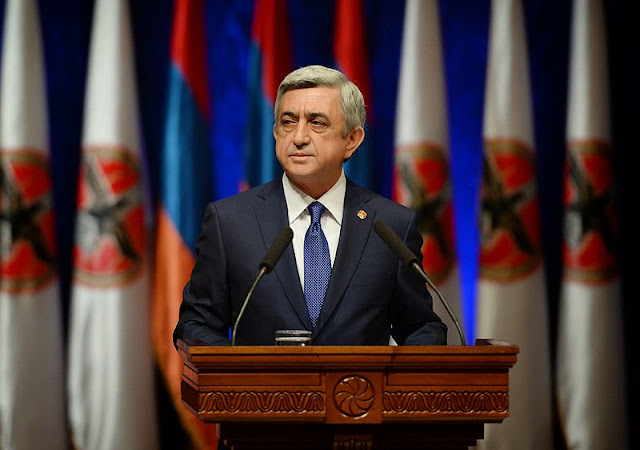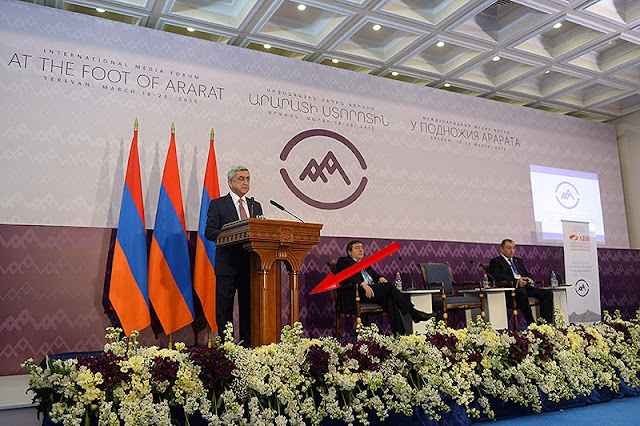четверг, 14 мая 2015 г.
воскресенье, 10 мая 2015 г.
Voice of America: Serious rift is developing between Russia and Turkey
Presents the abridged version of the article by Dorian Jones, published on the website of Voice of America:
A few months ago, bilateral relations between Turkey and Russia were on the upswing, buoyed by a close bond between their two presidents. Now, there is speculation that a serious rift is developing between the two countries, although powerful economic ties remain a unifying force. Fueling the speculation was President Vladimir Putin's backing of Armenia's genocide claims against Turkey, along with Ankara's refusal to attend Moscow's World War II commemorations and intensifying rhetoric by both sides.
Semih Idiz, diplomatic columnist for Turkey’s Taraf newspaper and the Al Monitor website, said there has been a remarkable reversal in bilateral relations.
"Until quite recently they were shown as exemplary relations," he said. "But they seemed to have hit rock bottom at the moment. And the best indication of that is Mr. Erdogan refusing to go to the May victory celebrations in Moscow. This whole impression that somehow Mr. Erdogan and Mr. Putin are bosom buddies — I think that has been shattered at the moment."
"Until quite recently they were shown as exemplary relations," he said. "But they seemed to have hit rock bottom at the moment. And the best indication of that is Mr. Erdogan refusing to go to the May victory celebrations in Moscow. This whole impression that somehow Mr. Erdogan and Mr. Putin are bosom buddies — I think that has been shattered at the moment."
In December, Ankara gave Putin a full state welcome, during which the Russian president described Turkey as a strategic partner. During that visit, Putin canceled a natural gas pipeline running through Bulgaria to Europe and announced plans to build a new pipeline through Turkey called “Turkish Stream.”
Volkan Ozdemir, an analyst for the Ankara-based Institute for Energy Markets and Policies, said such projects, along with wider trade, will be safe from the rising bilateral tensions. "I don't see any relation between
these political tensions and natural gas pipeline projects or deals including Turkish Stream," he said. "A Turkish and Russian bilateral relation is based on mutual economy interests, not strategic alliance. Russia is the first partner of Turkish imports and on the other hand, Russia serves as a big market for Turkish goods."
Soli Ozel, an International relations expert at Istanbul’s Kadir Has University, said Ankara's latest spat with Moscow has exposed the unbalanced nature of the relationship. "The Russians have not been at all forthcoming in terms of respecting where Turkey has interests," said Ozel. "So I don't see the Russians being particularly careful about not upsetting, offending or whatever the Turks, whereas the Turks have been usually pretty careful. This is, in my judgment, a relation of unequals."
Armenia President: The momentum gained in EEU process shouldn’t be weakened
 Armenia’s President Serzh Sargsyan, who is on working visit to Moscow, today attended the Supreme Eurasian Economic Council meeting, where he delivered a speech.
In his speech, Sargsyan noted that it is symbolic to hold the first meeting of the EEU on the eve of the 70th anniversary of the Great Victory of the Soviet people against Nazism. Congratulating the anniversary, Sargsyan said: “The legacy of our victory even today continues to serve a basis for the deepening of brotherly ties between our nations and mutually beneficial cooperation between our countries.”
According to President Sargsyan, the work in the EEU should be aimed at the increase of commercial and investment flows, enhancement of business ties, strengthening of the EEU institutions and, ultimately, achievement of a higher level of economic integration of the union countries. He also expressed hope that the decisions to be adopted during the meeting would allow to move forward in that direction.
Intrastate agreement process has been completed in Armenia, which means that Armenia is ready to sign the protocols agreed during the Eurasian Intergovernmental Council session in Moscow on February 6, 2015. “Thus, the signing of those protocols without changes will enable to move to the ratification process according to the legislation of the Republic of Armenia,” Sargsyan said.
Serzh Sargsyan also noted the importance of establishing mutually beneficial cooperation with BRICS countries and praised Russia’s key role in that process.
Among the priorities of the Union, Sargsyan mentioned the establishment of a joint power sector market and the step-by-step liberalization of service market.
“We consider that today it’s necessary not to weaken the gained momentum; we can’t be satisfied with our achievements, long-tem projects should be developed,” Sargsyan concluded.
Armenia’s President Serzh Sargsyan, who is on working visit to Moscow, today attended the Supreme Eurasian Economic Council meeting, where he delivered a speech.
In his speech, Sargsyan noted that it is symbolic to hold the first meeting of the EEU on the eve of the 70th anniversary of the Great Victory of the Soviet people against Nazism. Congratulating the anniversary, Sargsyan said: “The legacy of our victory even today continues to serve a basis for the deepening of brotherly ties between our nations and mutually beneficial cooperation between our countries.”
According to President Sargsyan, the work in the EEU should be aimed at the increase of commercial and investment flows, enhancement of business ties, strengthening of the EEU institutions and, ultimately, achievement of a higher level of economic integration of the union countries. He also expressed hope that the decisions to be adopted during the meeting would allow to move forward in that direction.
Intrastate agreement process has been completed in Armenia, which means that Armenia is ready to sign the protocols agreed during the Eurasian Intergovernmental Council session in Moscow on February 6, 2015. “Thus, the signing of those protocols without changes will enable to move to the ratification process according to the legislation of the Republic of Armenia,” Sargsyan said.
Serzh Sargsyan also noted the importance of establishing mutually beneficial cooperation with BRICS countries and praised Russia’s key role in that process.
Among the priorities of the Union, Sargsyan mentioned the establishment of a joint power sector market and the step-by-step liberalization of service market.
“We consider that today it’s necessary not to weaken the gained momentum; we can’t be satisfied with our achievements, long-tem projects should be developed,” Sargsyan concluded.
Подписаться на:
Комментарии (Atom)
















